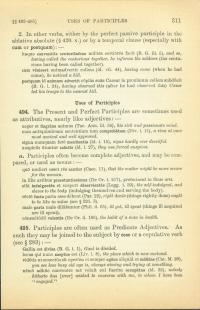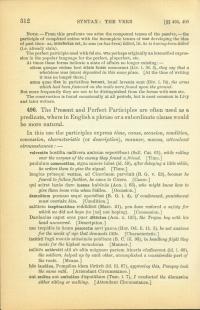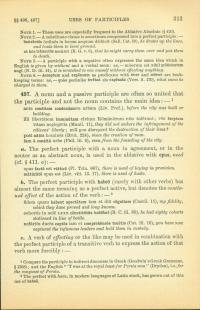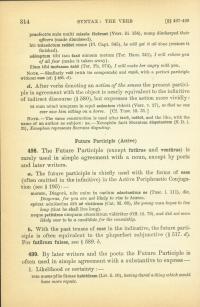494. The present and perfect participles are sometimes used as attributives, nearly like adjectives.
aeger et flagrāns animus (Tac. Ann. 3.54)
his sick and passionate mind
cum antīquissimam sententiam tum comprobātam (Div. 1.11)
a view at once most ancient and well approved
sīgna numquam ferē mentientia (id. 1.15)
signs hardly ever deceitful
Auspiciīs ūtuntur coāctīs. (id. 1.27)
They use forced auspices.
a. Participles often become complete adjectives, and may be compared, or used as nouns.
quō mulierī esset rēs cautior (Caec. 11)
that the matter might be more secure for the woman
in illīs artibus praestantissimus (De Or. 1.217)
preëminent in those arts
sibi indulgentēs et corporī dēservientēs (Legg. 1.39)
the self-indulgent, and slaves to the body
(indulging themselves and serving the body)
rēctē facta paria esse dēbent (Par. 22)
right deeds ought to be like in value
(things rightly done; see § 321.b)
male parta male dīlābuntur (Phil. 2.65)
ill got, ill spent
(things ill acquired are ill spent)
cōnsuētūdō valentis (De Or. 2.186)
the habit of a man in health
495. Participles are often used as predicate adjectives. As such they may be joined to the subject by esse or a copulative verb (see § 283).
Gallia est dīvīsa (B. G. 1.1)
Gaul is divided
locus quī nunc saeptus est (Liv. 1.8)
the place which is now enclosed
Vidētis ut senectūs sit operōsa et semper agēns aliquid et mōliēns. (Cat. M. 26)
You see how busy old age is, always aiming and trying at something.
nēmō adhūc convenīre mē voluit cui fuerim occupātus (id. 32)
nobody hitherto has [ever] with to converse me, to whom I have been “engaged”
Note— From this predicate use arise the compound tenses of the passive—the participle of completed action with the incomplete tenses of esse developing the idea of past time.
Interfectus est.
He was (or has been) killed
(lit. he is having-been-killed; i.e. already slain).
The perfect participle used with fuī etc. was perhaps originally an intensified expression in the popular language for the perfect, pluperfect, etc. At times these forms indicate a state of affairs no longer existing.
cōtem quoque eōdem locō sitam fuisse memorant (Liv. 1.36.5)
They say that a whetstone was (once) deposited in this same place.
[At the time of writing it was no longer there.]
Arma quae fīxa in parietibus fuerant, humī inventa sunt. (Div. 1.74)
The arms which had been fastened on the walls were found upon the ground.
But more frequently they are not to be distinguished from the forms with sum, etc. The construction is found occasionally at all periods, but is most common in Livy and later writers.
496. The present and perfect participles are often used as a predicate, where in English a phrase or a subordinate clause would be more natural. In this use the participles express time, cause, occasion, condition, concession, characteristic (or description), manner, means, attendant circumstances.
Volventēs hostīlia cadāvera amīcum reperiēbant. (Sall. Cat. 61)
While rolling over the corpses of the enemy they found a friend. [Time]
Paululum commorātus, sīgna canere iubet. (id. 59)
After delaying a little while, he orders them to give the signal. [Time]
Longius prōsequī veritus, ad Cicerōnem pervēnit. (B. G. 5.52)
Because he feared to follow further, he came to Cicero. [Cause]
quī scīret laxās dare iussushabēnās (Aen. 1.63)
who might know how to give them loose rein when bidden [Occasion]
Damnātum poenam sequī oportēbat. (B. G. 1.4)
If condemned, punishment must overtake him. [Condition]
Salūtem īnspērantibus reddidistī. (Marc. 21)
You have restored a safety for which we did not hope (to [us] not hoping). [Concession]
Dardanius caput ecce puer dētēctus (Aen. 10.133)
the Trojan boy with his head uncovered. [Description]
Nec trepidēs in ūsum poscenti saevī pauca. (Hor. Od. 2.11.5)
Be not anxious for the needs of age that demands little. [Characteristic]
Incitātīfugā montīs altissimōs petēbant. (B. C. 3.93)
In headlong flight they made for the highest mountains. [Manner]
Mīlitēs sublevātīaliī ab aliīs māgnam partem itineris cōnficerent. (id. 1.68)
The soldiers, helped up by each other, accomplished a considerable part of the route. [Means]
Hōc laudāns, Pompêius idem iūrāvit. (id. 3.87)
Approving this, Pompey took the same oath. [Attendant Circumstance]
Aut sedēns aut ambulāns disputābam. (Tusc. 1.7)
I conducted the discussion either sitting or walking. [Attendant Circumstance]
Note 1— These uses are especially frequent in the Ablative Absolute (§ 420).
Note 2— A coördinate clause is sometimes compressed into a perfect participle.
Īnstrūctōs ōrdinēs in locum aequum dēdūcit. (Sall. Cat. 59)
He draws up the lines, and leads them to level ground.
ut hōs trāductōs necāret (B. G. 5.6)
that he might carry them over and put them to death
Note 3— A participle with a negative often expresses the same idea which in English is given by without and a verbal noun.
Miserum est nihil prōficientem angī. (N. D. 3.14)
It is wretched to vex oneself without effecting anything.
Note 4— Acceptum and expēnsum as predicates with ferre and referre are bookkeeping terms.
quās pecūniās ferēbat eīs expēnsās (Verr. 2.170)
what sums he charged to them
497. A noun and a passive participle are often so united that the participle and not the noun contains the main idea.1
ante conditam condendamve urbem (Liv. Pref.)
before the city was built or building
Illī lībertātem imminūtam cīvium Rōmānōrum nōn tulērunt; vōs ēreptamvītam neglegētis? (Manil. 11)
They did not endure the infringement of the citizens' liberty; will you disregard the destruction of their lives?
post nātōs hominēs (Brut. 224)
since the creation of man
iam ā conditā urbe (Phil. 3.9)
even from the founding of the city
a. The perfect participle with a noun in agreement, or in the neuter as an abstract noun, is used in the Ablative with opus (need; cf. § 411.a).
Opus factō est viāticō. (Pl. Trin. 887)
There is need of laying in provision.
Mātūrātō opus est. (Liv. 8.13.17)
There is need of haste.
b. The perfect participle with habeō (rarely with other verbs) has almost the same meaning as a perfect active, but denotes the continued effect of the action of the verb.2
fidem quam habent spectātam iam et diū cōgnitam (Caecil. 11)
my fidelity, which they have proved and long known
Cohortīs in aciē LXXX cōnstitūtās habēbat. (B. C. 3.89)
He had eighty cohorts stationed in line of battle.
Nefāriōs ducēs captōs iam et comprehēnsōs tenētis. (Cat. 3.16)
You have now captured the infamous leaders and hold them in custody.
c. A verb of effecting or the like may be used in combination with the perfect participle of a transitive verb to express the action of that verb more forcibly.
Praefectōs suōs multī missōs fēcērunt. (Verr. 3.134)
Many discharged their officers (made dismissed).
Hīc trānsāctum reddet omne (Pl. Capt. 345)
He will get it all done.
(restore it finished)
Adēmptum tibi iam faxō omnem metum. (Ter. Haut. 341)
I will relieve you of all fear.
(make it taken away)
Illam tibi incēnsam dabō. (Ter. Ph. 974)
I will make her angry with you.
Note— Similarly volō (with its compounds) and cupiō, with a perfect participle without esse (cf. § 486.d).
d. After verbs denoting an action of the senses the present participle in agreement with the object is nearly equivalent to the Infinitive of Indirect Discourse (§ 580), but expresses the action more vividly.
ut eum nēmō umquam in equō sedentemvīderit (Verr. 5.27)
so that no one ever saw him sitting on a horse.
[cf. Tusc. 3.31.]
Note— The same construction is used after faciō, indūcō, and the like, with the name of an author as subject.
Xenophōn facit Sōcratem disputantem. (N. D. 1.31)
Xenophon represents Socrates disputing.
Footnotes
2.The perfect with have, in modern languages of Latin stock, has grown out of this use of habeō.




